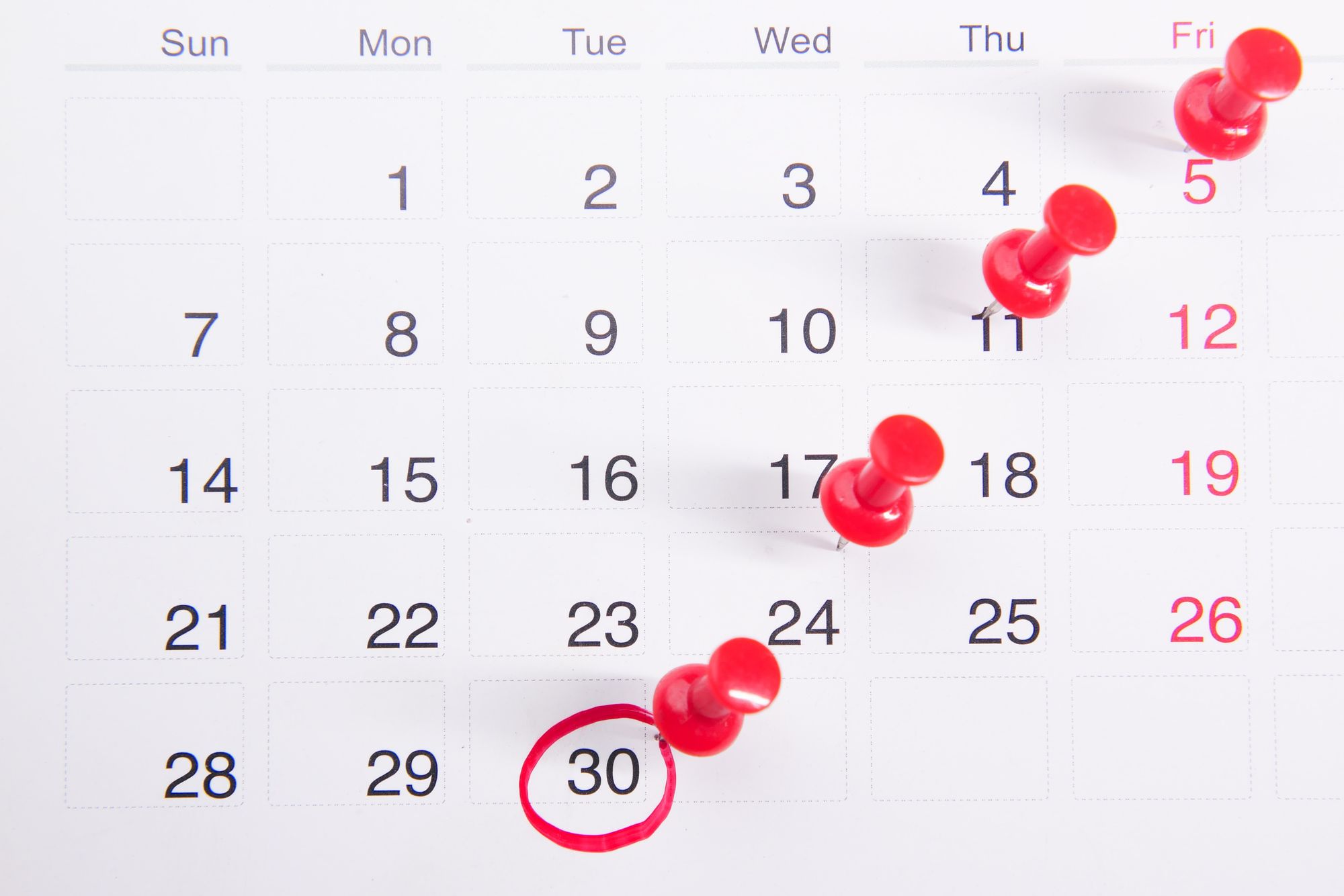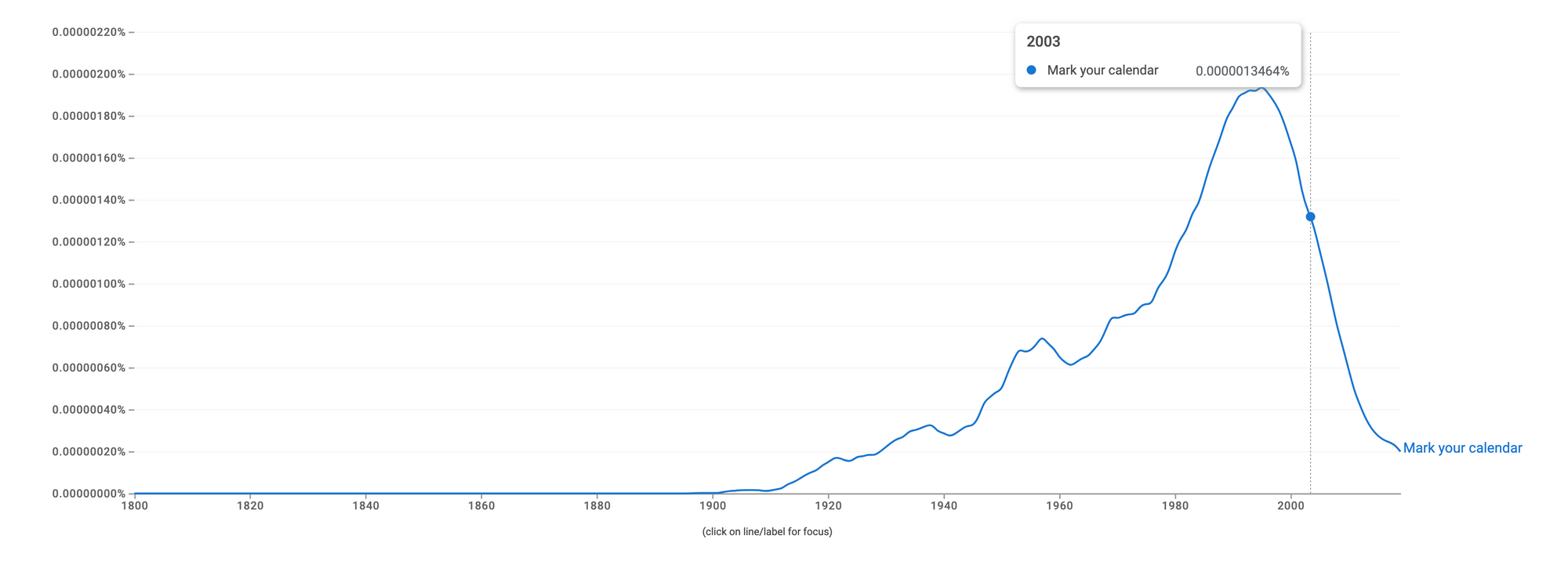The expression "mark your calendar" is a straightforward directive that means to make a note of an important date or event on your calendar. It can be both a polite reminder and a way to emphasize the significance of the date being referred to.

The use of the phrase "Mark Your Calendar" over the years

The phrase has been experiencing a decrease in use starting from the 1990s.
When to Use: "Mark Your Calendar"
Reminder
Use this phrase when you want to politely remind someone to note an important date or event on their calendar.
This sentence is a reminder to someone to add an important date, June 15th, to their calendar. Specifically, it's reminding the person to mark the date because there is an upcoming event—the company's annual picnic—scheduled for that day.
Emphasis
Employ "mark your calendar" to stress the significance of the event or date being mentioned.
By saying, "Mark your calendar," the speaker is underlining the need for the listener to take action and make a note of the date on their calendar. The phrase is used to create a sense of anticipation and to stress that the event is rare and highly valuable, encouraging the listener to plan and ensure they are prepared to witness the solar eclipse.
More example sentences
- Mark your calendar for the company's annual holiday party on December 10th.
- Don't forget to mark your calendar for the release of the highly anticipated movie next Friday.
- We should all mark our calendars for the school's parent-teacher conferences.
- Mark your calendar for the charity fundraising event to support a good cause.
- Please mark your calendar for the important product launch event on March 15th.
- Let's mark our calendars for the family reunion scheduled for this summer.
- Don't miss out on the art exhibition; be sure to mark your calendar for the opening day.
- We need to mark our calendars for the conference; it's a great networking opportunity.
- Mark your calendar for the lunar eclipse; it's a celestial event you won't want to miss.
- Be sure to mark your calendar for the book signing by your favorite author at the local bookstore.
More examples from the web
"So, please mark your calendars for March 3rd and have a listen to some of her songs here." - Huffington Post
"So if you fall into one of those categories, please mark your calendars and join TechCrunch on April 18 , 2019" - TechCrunch
"We'll have more information on sponsors and hours shortly, but please mark your calendars and we'll see you soon." - TechCrunch
"Also mark your calendars for a live chat on this topic at noon EDT/5pm BST on 10 June." - The Guardian
"Mark your calendar" is more about noting a specific date or event, while "mark your schedule" can encompass a broader range of time management and planning activities.
Synonyms
- Save the Date: An alternative expression often used for wedding invitations and important events.
- "Save the date for Sarah and Mark's wedding on September 22nd, 2023; it's going to be a beautiful celebration, and we'd love to have you there with us."
- Note the Date: A more direct way to ask someone to record an event on their calendar.
- "Please note the date of the department meeting on your calendar, as it's an essential gathering to discuss our upcoming projects."
Antonyms
Antonyms of "Mark your calendar" would be phrases that indicate the opposite action or sentiment, suggesting that you don't need to remember, note, or attend an event. Some antonyms for "Mark your calendar" could include:
- Forget About It: This phrase implies that you should not bother remembering or noting the event because it's not significant or important.
- "You can forget about it; the meeting was canceled."
- No Need to Attend: This suggests that there is no obligation or requirement to be present at the event.
- "There's no need to attend the training session if you're already familiar with the topic."
- Don't Worry About It: This conveys the idea that the event is not a matter of concern or significance.
- "Don't worry about it; the conference isn't mandatory."
- It's Not Worth Remembering: This phrase implies that the event is not memorable or important.
- "The details are so trivial that it's not worth remembering."
- Disregard the Date: This indicates that you can ignore or dismiss the date without consequences.
- "You can disregard the date for the event since it's been postponed."
Common Idioms
- Circle the Date: An idiom indicating a date or event of particular importance.
- Pencil It In: Suggests temporarily noting a date or event in case plans change.
Summary
In summary, "mark your calendar" is a versatile expression used for reminding someone to note an important date or event on their calendar. It's a handy phrase that can be applied in a variety of contexts, from casual to formal, to ensure that significant dates are not forgotten. Understanding the nuances of this expression will help you communicate effectively when it comes to scheduling and planning.
Want to sound like a native speaker?
Engram’s AI-powered grammar checker makes your English sound like a native speaker’s, suggesting natural English expressions on top of fixing grammar, spelling, punctuation, word order, and vocabulary.

Reference:














